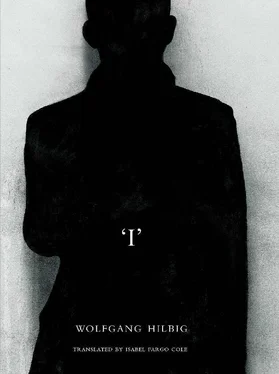Earlier he’d even had an armchair down here, but one day it had vanished on him. It was a red easy chair, already gleaming greasily in numerous places, but comfy and wide as though built for two people; it was the only piece of furniture he owned, from a small flat in the outskirts of the city which he had actually inhabited, had sometimes, or even still, inhabited exclusively. . his habitations were a murky affair; sometimes he’d had several different addresses, but most of them only on paper. He had transported the armchair downtown via S-Bahn, in late spring, when Berliners were already getting ready for holiday, and he’d almost provoked a riot in the overcrowded train. The armchair was tailor-made for afternoon naps, but then he’d kept it in the basement because in the flat — in the main flat — it had become too great an uncertainty factor for him. — And so the armchair had served him as a resting place by the cool concrete wall, when he fled down early from the summer heat and savoured the silence in the turbid light. He would literally sprawl, stretching his arms out on the plump armrests, resting his feet on a produce crate; his back fit perfectly into the concave backrest, the top of which bore a blackish impression from the back of his head. . and the back of the head that had rested there before him. . this smudge of grime marked the point where the back of the mind worked, above the upright, fully relaxed neck so safely cushioned. . he sat enthroned, the basement air flowing through and seeming to invigorate him, as though he were sitting at the oxygen’s very source. And so he thought about oxygen. . it seemed to him that he breathed what was in him, and what flowed out of him, he took in again, so that he was one with the atmosphere surrounding him. . he fell asleep and woke up again and woke to fall asleep again, down here where time stagnated and circled him as though humming, and it was as though he exhaled this time from his lungs as well. For a time he was the patriarch of the underworld down here, autocrat of an unknown twilit realm, he rested unchallenged, and all thoughts were such remote, wearying premises of the life above that he could easily drop them the moment they touched him. — This lasted until one day the giant phallus appeared on the concrete wall. . or was it the appearance of the mark ‘C’ beneath the giant drawing — these were turbulent times! Soon after that the armchair was slashed with knives and then stolen; he had to make do with the produce crate. Was it really only from that day on he’d felt observed and menaced down here?. . Looking back, he had to deny it. — It was like the incursion of reality into an invented state. . suddenly he was no longer alone there. He might have to place himself in relation to those who, like him, were present down here, perhaps he’d have to compare his I with others, who perhaps said I as well, down here. Perhaps then he would find that his own I was hollow and fantastic; at least no longer independent, at least no longer to be forgotten or summoned from forgetfulness at a whim. .
How it had happened remained a mystery to him; there was no real motive for the red armchair’s theft, it could only be an act of terror. Who could even transport such a monstrosity? It was unlikely that anyone knew the complicated access route by which he’d carried the thing in, and he’d carefully closed up and blocked off this access route again. Who could cross his path down here, who was observing him, trailing him, who down here was contesting his place? Probably these questions were quite pointless.
Not knowing something, he said to himself, has always been highly repugnant to me! His aversion towards all sorts of incomprehension had always verged on neurosis. He tended towards paranoid reactions when faced with things he couldn’t get a handle on. . making his character perfectly suited to his task. This quality was virtually providential; in his case it could almost be called a talent. What would have been regarded as an odd tic, to put it kindly, in any other field, was in his case a tenacious and reliable gift, practically indispensable. More appreciation should have been shown for his inclination towards small but purposeful steps; after all, that was the only way to create a network of disclosures throughout the city, a network of disclosures . . somehow only Feuerbach had had an inkling of it. But Feuerbach was only a kind of secretary, and something was increasingly blighting him. . his aversion towards any kind of purposefulness doubtless told of some kind of blight. .
Why had these shadowy characters suddenly been unleashed upon him?—W. could only conclude that the destruction and theft of the red armchair had to be chalked up to the shock troops they were deploying these days. . and who had now invaded his refuge. In other words, the sort of characters who had nothing to do but create a primitive sense of insecurity. It was old news that such groups existed aplenty, drummed together in outlying bars or on the sidelines of football fields. And increasingly they seemed to be bought on short notice, for one-time jobs, leaving wreckage and confusion and vanishing again. These were fringe elements — leather-jacket types, members of motorcycle gangs — who filled their perpetual free time with drinking and rampaging, often recognizable by their shaven heads. You got hold of these goons and told them they could go on practising their hobby, but now the ‘object’ would be picked out for them. And they could earn a few marks in the process. . otherwise you’d bust them up, and their combined force, which after all was valuable, would soon melt away behind iron bars — ultimately it was the same principle they used to catch everyone. Now the prevalence of these shock troops was increasing; there were some that were permanent fixtures and some that were recruited for one-time jobs from the sandy deserts at the fringes of the housing projects. The unpleasant thing about the latter was that they weren’t integrated, they lurked everywhere, on call. . you never knew if they were acting on orders, you didn’t know if you could get involved with them, you didn’t know what side they were currently on. — Surely W. wasn’t wrong to see this state of affairs as a symptom of fatigue, as an abandonment of the more intelligent approaches in favour of destructive force. . a force which had ultimately ceased to believe in a goal . — Disruption: to his mind the word featured more and more prominently in the parlance of the service units. . in fact, if he wasn’t mistaken, more and more often it was even superseded by the word destruction .
And so he saw anarchy looming — and asked himself whether this wouldn’t inevitably bring the collapse of the entire system. Probably the answer was yes. . and he knew that thoughts like that took him onto thin ice. With thoughts like that he was practically courting closer scrutiny. It didn’t matter that no one knew of these thoughts but he; he thought them only down here in the basement, he’d never thought them up in the light. . the sunlight, it seemed to him, would inevitably summon to his brow the agitation that came in their wake, the thoughts would take eloquent form in the deeply downturned corners of his mouth, or the film of sweat on the skin of his face would seem to permit but one conclusion: he had thought of the end . . not the beginning, when blind as a mole he ventured up towards the light.
Or perhaps there was no significance to such a thought becoming known? Actually he had to admit that the service he was in quite naturally engendered reflections of this kind. And this led logically to the necessity. . definitely even the primary necessity. . of watching the collaborators in service: security was the adherence to an infinite logical consistency! To watch those in the service as they performed their function, to watch the watchers, to maintain watchfulness towards the watchers’ inevitable thoughts of their own through the knowledge that they were being watched. . to watch over sleep. . to watch that in sleep all that drowsed was the I , while the watch went on following its logic.
Читать дальше












